
APL Materials
metrics 2024
Advancing the frontiers of materials science.
Introduction
APL Materials is a prestigious open access journal published by AIP Publishing that has been at the forefront of disseminating cutting-edge research in the fields of materials science and engineering since its inception in 2013. With an impressive impact factor reflecting its significance, APL Materials ranks securely in the Q1 quartile in both Engineering (miscellaneous) and Materials Science (miscellaneous) categories, underscoring its role as a vital resource for innovative scientific inquiry. Ranked highly in Scopus, particularly in General Engineering (24/307) and General Materials Science (78/463), the journal provides a platform for researchers, professionals, and students to share their findings and advancements that push the boundaries of material applications. Furthermore, its open access policy ensures that high-quality research is freely available to a global audience, fostering collaborative advancements in the scientific community. As the journal continues to evolve through to 2024, it remains committed to presenting groundbreaking studies that contribute to the advancement of materials science and engineering disciplines.Explore APL Materials to stay at the cutting edge of research and innovation.
Metrics 2024
 1.53
1.53 5.30
5.30 5.50
5.50 85
85Metrics History
Rank 2024
Scopus
IF (Web Of Science)
JCI (Web Of Science)
Quartile History
Similar Journals
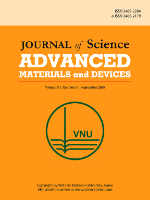
Journal of Science-Advanced Materials and Devices
Empowering Discoveries in Advanced Materials and DevicesJournal of Science-Advanced Materials and Devices is a leading open-access journal published by Vietnam National University, dedicated to advancing the field of materials science through cutting-edge research and innovative developments. Since its inception in 2016, this journal has become a pivotal platform for sharing insights and discoveries in various subfields, including biomaterials, ceramics and composites, and electronic, optical, and magnetic materials. With impressive quartile rankings, including Q1 across multiple categories in 2023, and a notable Scopus ranking placing it in the top 15th percentile for ceramics and composites, it highlights the journal’s influence and prestige within the global academic community. Open Access since its launch, the journal aims to facilitate unrestricted dissemination of scholarly work, empowering researchers, professionals, and students to engage with the latest advancements. The Journal of Science-Advanced Materials and Devices is vital for those seeking high-quality contributions that influence both theoretical understanding and practical applications in the ever-evolving landscape of materials science.
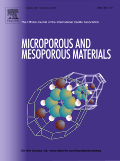
Microporous and Mesoporous Materials
Connecting Researchers in the World of Microporous MaterialsMicroporous and Mesoporous Materials is a leading academic journal published by ELSEVIER, specializing in the field of porosity characterization and applications of microporous and mesoporous materials. With an impactful Q1 ranking in various categories, including Chemistry, Condensed Matter Physics, and Materials Science, this journal serves as a vital resource for researchers, professionals, and students focused on advancing the understanding and application of these materials. Established in 1998 and set to continue its influence until 2024, the journal's rigorous peer-review process ensures the dissemination of high-quality research findings. Additionally, its commitment to open access publishing broadens accessibility, fostering an inclusive community dedicated to innovation in nanoscience, materials physics, and engineering. The journal's Scopus rankings highlight its prestigious standing, placing it among the top percentile within pertinent fields. For those engaged in cutting-edge research or education within these sectors, Microporous and Mesoporous Materials remains an essential journal for current advancements and insights.
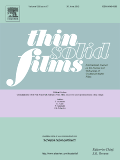
Thin Solid Films
Unveiling the Science Behind Advanced Thin Film SolutionsThin Solid Films, published by ELSEVIER SCIENCE SA, is a highly regarded journal in the fields of materials science and physics, specifically focused on the properties and applications of thin films. Established in 1967, this journal has been a leading platform for disseminating research on surfaces, coatings, and advanced materials. With its consistent publication through the notable HIndex of scholarly impact, this journal showcases a diverse range of studies ranging from electronic, optical, and magnetic materials to novel surface and interface engineering. In recent evaluations, Thin Solid Films has achieved significant rankings, including a Q2 position in Materials Chemistry and Metals and Alloys, reflecting its relevance and importance in ongoing scientific discourse. Although it does not offer open access, it provides a vital resource for researchers, professionals, and students seeking to advance their knowledge and expertise in thin film technology. The journal's commitment to quality and innovation makes it an essential publication for anyone engaged in the field.

Materials Today Communications
Advancing Materials Knowledge for a Sustainable FutureMaterials Today Communications, published by ELSEVIER, stands as a prominent platform within the fields of Materials Chemistry, Materials Science, and Mechanics of Materials. With an open access format, this journal facilitates global dissemination of knowledge, aimed at enhancing collaboration and innovation among researchers, professionals, and students worldwide. Established in 2014 and converging through 2024, the journal has rapidly ascended through the ranks, achieving a commendable Q2 category status in multiple relevant categories. Specifically, its Scopus rankings highlight its influence, with rankings in the 64th to 69th percentile in various materials science domains. A key resource for those engaged in cutting-edge materials research, Materials Today Communications provides insightful coverage of contemporary advancements, bridging the gap between theoretical exploration and practical application.
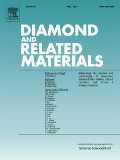
DIAMOND AND RELATED MATERIALS
Exploring the brilliance of diamond research.DIAMOND AND RELATED MATERIALS, published by Elsevier Science SA, serves as a premier international platform for the dissemination of high-quality research in the fields of materials science, electrical engineering, and chemistry, with a specialized focus on diamond and its related materials. With an ISSN of 0925-9635 and an E-ISSN of 1879-0062, this journal has established itself within the top quartiles, reflecting its influential contribution to the scientific community, particularly in the categories of Chemistry (miscellaneous) and Electrical Engineering, among others. The journal's wide scope encompasses both theoretical and applied aspects of diamond research, making it an essential resource for professionals and academics alike. The current rankings position it favorably within its respective disciplines, with a notable 79th percentile in General Physics and Astronomy and strong standings in related categories. Although it does not offer open access, researchers can stay informed of cutting-edge advancements and methodologies through its comprehensive articles and reviews, enriching the wider discourse in advanced materials research.

Materials Letters-X
Driving Progress in Mechanical Engineering and BeyondMaterials Letters-X, published by ELSEVIER, is an esteemed open-access journal dedicated to the rapid communication of research in the fields of Condensed Matter Physics, Materials Science, Mechanical Engineering, and Mechanics of Materials. Launched in 2019, this journal has quickly established itself within the academic community, achieving Q3 quartile rankings in several categories according to the 2023 metrics. The journal's impactful contributions are reflected in its Scopus rankings, notably within Mechanical Engineering (Rank #308) and Mechanics of Materials (Rank #199). The open-access model promotes widespread dissemination and accessibility, ensuring that cutting-edge advancements in material science are readily available to researchers, professionals, and students worldwide. As it continues to grow, Materials Letters-X aims to inspire innovation and collaboration across disciplines, making it a pivotal resource for those engaged in material research and applications.
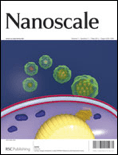
Nanoscale
Connecting Global Minds in Nanoscience.Nanoscale is a premier academic journal published by the Royal Society of Chemistry, dedicated to advancing the field of nanoscience and nanotechnology. With both its ISSN (2040-3364) and E-ISSN (2040-3372) ensuring wide accessibility, the journal is renowned for its high-impact research contributions, reflected in its impressive 2023 Impact Factor and prestigious Q1 ranking in both Materials Science (Miscellaneous) and Nanoscience and Nanotechnology categories. Since its inception in 2009, Nanoscale has fostered a collaborative platform where leading researchers from around the globe share their innovative findings across a multitude of topics spanning from material synthesis to applications in nanotechnology. The journal not only serves as a valuable resource for professionals, researchers, and students but also actively engages the academic community in discussing emerging trends, thus shaping the future of nanoscience. Situated in the heart of the UK at Thomas Graham House, Science Park, Milton Rd, Cambridge CB4 0WF, Nanoscale remains a key publication for those looking to keep abreast of the latest breakthroughs in an ever-evolving field.

MRS Advances
Advancing the Frontiers of Materials ScienceMRS Advances, published by Springer Heidelberg, is an esteemed academic journal that serves as a vital platform for disseminating cutting-edge research in the fields of condensed matter physics, materials science, and mechanical engineering. With an ISSN of 2731-5894 and an E-ISSN of 2059-8521, the journal is hosted in Switzerland and encompasses an impressive spectrum of innovative studies that impact both theoretical and practical applications. Throughout its converged years from 2012 and continuing through 2024, MRS Advances has established itself with notable rankings, including Q4 in condensed matter physics and Q3 in several related categories. This journal not only enriches the academic community with its rigorous peer-reviewed articles, but also encourages open discussions that further advance research innovations. Although currently not designated as an open-access journal, its accessibility through institutional subscriptions ensures that professionals, researchers, and students can engage with the latest advancements in the material science arena. Emphasizing its relevance, MRS Advances is dedicated to fostering interdisciplinary collaboration and inspiring new discoveries within the global research community.

Journal of the Australian Ceramic Society
Advancing the Science of Ceramics and CompositesThe Journal of the Australian Ceramic Society, with ISSN 2510-1560 and E-ISSN 2510-1579, is a distinguished publication by SPRINGER, dedicated to advancing the field of ceramics and composites. Located in Switzerland, this journal serves as a vital platform for researchers, professionals, and students in the realm of materials science, particularly focusing on the innovative applications and developments within ceramics and materials chemistry. Achieving a Q3 quartile ranking in both the Ceramics and Composites and Materials Chemistry categories in 2023, it reflects its commitment to fostering knowledge exchange and intellectual discourse in these critical areas, as evidenced by its Scopus rankings. Spanning from 2007 to 2024, the journal not only supports rigorous peer-reviewed research but also encourages accessibility to cutting-edge findings, making it an essential resource for anyone engaged in ceramic materials research.

New Materials Compounds and Applications
Exploring Innovative Frontiers in Materials ScienceNew Materials Compounds and Applications is a pioneering journal published by JOMARD PUBLISHING, focusing on the latest advancements in materials science, particularly in the realms of analytical, inorganic, and organic chemistry. Since its inception in 2019, this journal has quickly established itself as a valuable resource for researchers and professionals seeking to explore innovative compounds and their applications across various fields. With an ISSN of 2521-7194 and an E-ISSN of 2523-4773, New Materials Compounds and Applications is indexed in Scopus, demonstrating its scholarly impact, albeit currently positioned in the Q3 and Q4 quartiles for several chemistry categories. The journal serves as a platform for disseminating research findings and fostering collaboration among scientists in Azerbaijan and beyond. Although it operates under a traditional access model, the journal aims to bridge the gap between theoretical studies and practical applications, making it essential reading for students and professionals looking to stay updated in the dynamic landscape of materials chemistry.